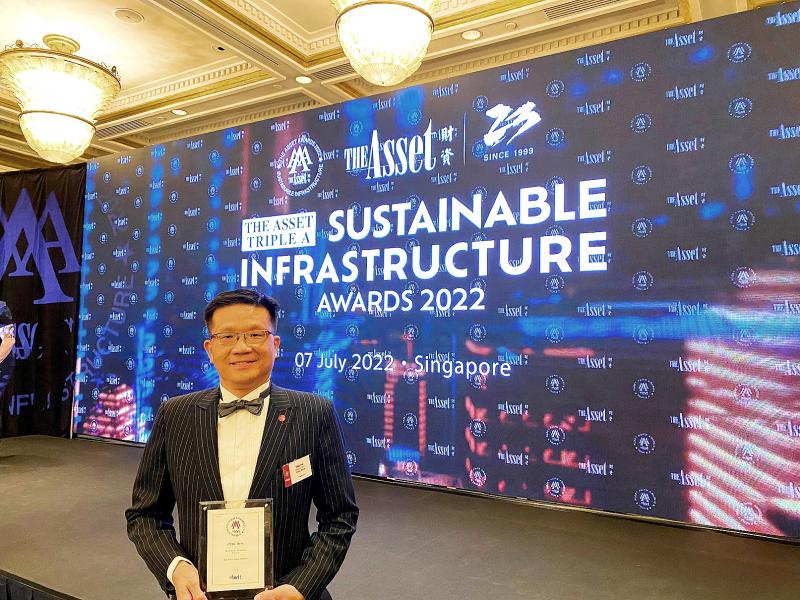CTBC Bank (中國信託銀行) has been honored with three awards at the annual Sustainable Infrastructure Awards organized by The Asset magazine, the bank said in a statement on Thursday.
The bank won the “Renewable Energy M&A Deal of the Year, Global” and the “Renewable Energy M&A Deal of the Year, Taiwan” awards for leading a syndicated loan last year to Orsted A/S’ Changfang (彰芳) and Xidao (西島) wind farms off the coast of Changhua County, the statement said.
CTBC also managed a syndicated loan for Zhong Neng (中能) offshore wind farm off the coast of Changhua County, which won the “Renewable Energy Deal of the Year — Offshore Wind, Taiwan” award.

Photo courtesy of CTBC Bank
The awards demonstrate that the bank’s performance in green energy project financing has won international recognition, it said.
The awards were presented at the Asset Sustainable Infrastructure Awards Dinner in Singapore on Thursday.
CTBC Bank president James Chen (陳佳文) said the bank has followed the government’s policy to help build Taiwan into an industrial cluster for the development of offshore wind energy technology in Asia.
The bank was ahead of its local peers in providing financial services for the offshore wind energy sector in 2018. It has since introduced a number of innovative technologies and indicators, and set up a dedicated financial advisory team and project financing team, Chen said.
At a time when other domestic banks were not financing wind power projects, CTBC was cooperating with a number of foreign banks to successfully develop offshore wind farm project financing, applying its experience in managing syndicated loans and its advantages from well-established domestic and foreign bases, it said.
CTBC served as domestic financial adviser and lead coordinating bank for a NT$45 billion (US$1.5 billion) syndicated loan for the Zhong Neng offshore wind farm, backed by China Steel Corp (中鋼) and Copenhagen Infrastructure Partners K/S. Twenty banks participated in the loan, 16 of which were local banks, including eight state-owned lenders, it said.
The loan was 250 percent oversubscribed, setting a record for wind energy project financing in Taiwan, it added.

PROTECTION: The investigation, which takes aim at exporters such as Canada, Germany and Brazil, came days after Trump unveiled tariff hikes on steel and aluminum products US President Donald Trump on Saturday ordered a probe into potential tariffs on lumber imports — a move threatening to stoke trade tensions — while also pushing for a domestic supply boost. Trump signed an executive order instructing US Secretary of Commerce Howard Lutnick to begin an investigation “to determine the effects on the national security of imports of timber, lumber and their derivative products.” The study might result in new tariffs being imposed, which would pile on top of existing levies. The investigation takes aim at exporters like Canada, Germany and Brazil, with White House officials earlier accusing these economies of

Teleperformance SE, the largest call-center operator in the world, is rolling out an artificial intelligence (AI) system that softens English-speaking Indian workers’ accents in real time in a move the company claims would make them more understandable. The technology, called accent translation, coupled with background noise cancelation, is being deployed in call centers in India, where workers provide customer support to some of Teleperformance’s international clients. The company provides outsourced customer support and content moderation to global companies including Apple Inc, ByteDance Ltd’s (字節跳動) TikTok and Samsung Electronics Co Ltd. “When you have an Indian agent on the line, sometimes it’s hard

‘SACRED MOUNTAIN’: The chipmaker can form joint ventures abroad, except in China, but like other firms, it needs government approval for large investments Taiwan Semiconductor Manufacturing Co (TSMC, 台積電) needs government permission for any overseas joint ventures (JVs), but there are no restrictions on making the most advanced chips overseas other than for China, Minister of Economic Affairs J.W. Kuo (郭智輝) said yesterday. US media have said that TSMC, the world’s largest contract chipmaker and a major supplier to companies such as Apple Inc and Nvidia Corp, has been in talks for a stake in Intel Corp. Neither company has confirmed the talks, but US President Donald Trump has accused Taiwan of taking away the US’ semiconductor business and said he wants the industry back

PROBE CONTINUES: Those accused falsely represented that the chips would not be transferred to a person other than the authorized end users, court papers said Singapore charged three men with fraud in a case local media have linked to the movement of Nvidia’s advanced chips from the city-state to Chinese artificial intelligence (AI) firm DeepSeek (深度求索). The US is investigating if DeepSeek, the Chinese company whose AI model’s performance rocked the tech world in January, has been using US chips that are not allowed to be shipped to China, Reuters reported earlier. The Singapore case is part of a broader police investigation of 22 individuals and companies suspected of false representation, amid concerns that organized AI chip smuggling to China has been tracked out of nations such